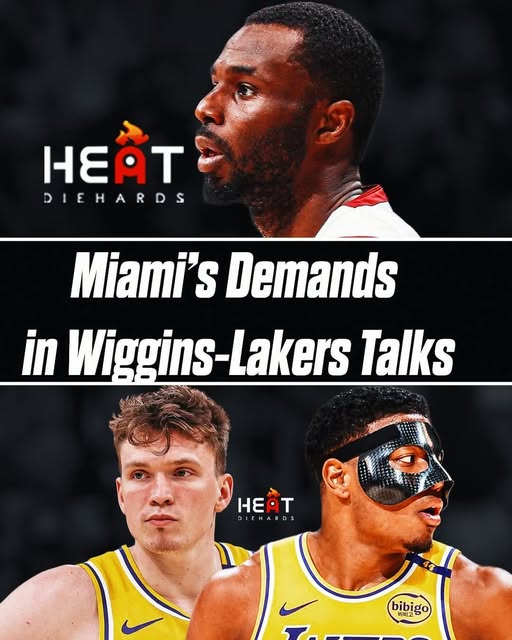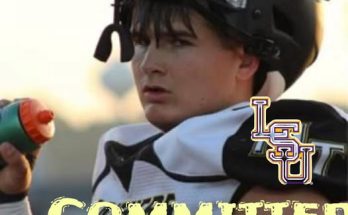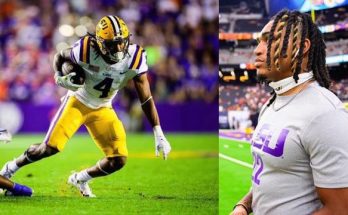The Miami Heat, long known for their calculated aggression in roster building, are reportedly circling an ambitious new trade scenario that could shake up the Eastern Conference landscape. According to multiple sources close to the situation, Miami is targeting a package from the Los Angeles Lakers centered around rookie sharpshooter Dalton Knecht, versatile forward Rui Hachimura, and a future first-round pick. In exchange, the Heat would send former All-Star Andrew Wiggins to Los Angeles. While no deal is finalized, the buzz surrounding the potential transaction has ignited a wave of speculation about Miami’s strategic direction, the Lakers’ win-now urgency, and Wiggins’ fluctuating market value.
The rumor comes at a crucial juncture in the Heat’s pursuit of championship contention. After making the NBA Finals in 2020 and 2023 and the Eastern Conference Finals in 2022, Miami has established itself as a postseason stalwart under the leadership of Jimmy Butler, Bam Adebayo, and Erik Spoelstra. However, last season’s first-round exit at the hands of the Boston Celtics exposed the team’s glaring need for offensive depth and athleticism on the wing. Tyler Herro’s inconsistency, Kyle Lowry’s decline, and Duncan Robinson’s defensive liabilities have forced the Heat front office to reimagine the roster’s structure. The rumored deal for Knecht and Hachimura suggests a pivot toward balancing age with upside, shooting with size, and versatility with financial flexibility.
At the heart of this proposed trade lies Dalton Knecht, the 17th overall pick in the 2024 NBA Draft. A 6’6” shooting guard out of Tennessee, Knecht built his reputation as a lethal scorer with deep range, strong off-ball movement, and underrated physicality. He lit up college basketball with numerous 30-point performances and drew comparisons to players like Desmond Bane and Kevin Huerter due to his blend of size and perimeter skill. For the Heat, acquiring Knecht would inject much-needed youth and shooting into an aging perimeter rotation. Given Miami’s track record of developing shooters—think Max Strus, Gabe Vincent, and Duncan Robinson—Knecht could flourish in a system that values spacing, ball movement, and defensive accountability.
The inclusion of Rui Hachimura in the deal adds an intriguing layer of intrigue and fit. At 6’8” with a 7’2” wingspan, Hachimura brings positional versatility, midrange scoring, and the physical tools to defend multiple positions. He’s had moments of brilliance in both Washington and Los Angeles, but has yet to string together a season of consistent impact. Still only 26 years old, Hachimura fits within Miami’s competitive window while also providing a potential long-term piece alongside Bam Adebayo in the frontcourt. Hachimura’s ability to hit catch-and-shoot threes and body up larger forwards gives the Heat tactical options on both ends of the court, especially against Eastern Conference juggernauts like the Celtics and Bucks.
Meanwhile, the first-round pick would be a valuable asset in a league where draft capital is increasingly necessary for future moves. Miami has frequently been short on trade assets in recent years, often held back from making bigger moves by their limited draft flexibility. Adding a pick from the Lakers—even a future one in 2028 or 2029—could provide the Heat with the leverage needed to make a larger splash down the line, whether that’s swinging for a star or moving up in a draft class. More subtly, it’s also a hedge against Miami’s aging core and Butler’s advancing age. Securing young talent and picks ensures continuity after their current title window begins to close.
The player heading out in this scenario, Andrew Wiggins, represents both a gamble and a potential reward for the Lakers. Wiggins, once a No. 1 overall pick, has had a rollercoaster NBA career. After early struggles in Minnesota, he found redemption in Golden State, playing a crucial role in the Warriors’ 2022 championship run as a two-way wing capable of guarding elite scorers and hitting timely shots. However, injuries and personal issues have led to inconsistency the past two seasons, and his role diminished significantly in Golden State’s hierarchy. A fresh start in a bigger market with a clearer role might be exactly what Wiggins needs to revive his career.
From a Lakers standpoint, the motivation is transparent: maximize LeBron James’ final years and pair him with wings who can defend and shoot. Wiggins, at his best, offers exactly that. His ability to guard multiple positions, contribute as a secondary scorer, and play off of stars like LeBron and Anthony Davis makes him an ideal plug-and-play option—if he’s engaged. The Lakers have lacked consistent wing defense ever since losing key contributors like Kentavious Caldwell-Pope and Kyle Kuzma, and Wiggins could help fill that void while also reducing the offensive burden on James. If he returns to his 2022 form, this trade could be a massive win for Los Angeles in the short term.
Still, this potential trade is not without risk on both sides. Miami would be trading away the most proven player in the deal in Wiggins, a move that could backfire if Knecht doesn’t adjust quickly to the NBA or if Hachimura continues to plateau. Wiggins, when healthy and motivated, has proven capable of making a difference on the biggest stage, and Miami—still striving to win a title with Butler—could come to regret dealing away such a talent in exchange for potential. On the flip side, if Wiggins remains inconsistent or unmotivated in L.A., the Lakers will have sacrificed a young shooter in Knecht, a useful forward in Hachimura, and a future first for a reclamation project.
Timing also plays a factor in this buzz. The Heat are operating under increasing pressure to deliver results before Jimmy Butler’s championship window closes. Now 35, Butler has played through multiple postseason injuries in recent years and has hinted at wanting an extension. Miami needs to reinforce his supporting cast now, or risk wasting the final years of his prime. Trading for Knecht and Hachimura walks a tightrope between building for the future and staying competitive in the present. It’s a move that speaks to long-term strategic thinking as much as short-term roster concerns.
Likewise, the Lakers are fighting against the clock with LeBron James. Entering a historic 23rd NBA season, James continues to defy time, but the end is undeniably near. Los Angeles cannot afford to wait for Knecht to develop or for Hachimura to become more consistent. They need contributors now, particularly on the wing, where they struggled in last year’s playoffs against more athletic and dynamic teams like Denver and Minnesota. Wiggins may be their best shot at adding a playoff-tested veteran with upside at a reasonable cost.
Financially, the deal would also make sense for both sides. Wiggins is owed over \$26 million annually through the 2026-27 season. By acquiring Knecht on a rookie-scale deal and Hachimura’s mid-level salary, Miami would free up financial flexibility moving forward—particularly important as they try to avoid the new second apron penalties under the NBA’s updated collective bargaining agreement. The Lakers, meanwhile, would consolidate salary and potentially open up a roster spot to pursue buyout candidates or veterans later in the season.
In a broader context, this trade rumor highlights how the NBA is increasingly defined by proactive risk-taking and strategic recalibration. Gone are the days when teams clung to core pieces for sentimental or symbolic reasons. Miami and Los Angeles are both franchises defined by their hunger for banners, not balance sheets. That makes them willing to pull the trigger on deals that offer the promise of flexibility, functionality, and—ultimately—championship potential. The fact that this rumor has surfaced now, during a period of relative offseason quiet, suggests that deeper conversations may be happening behind closed doors.
Ultimately, whether or not the trade materializes, the reported interest itself says a great deal about where the Miami Heat are headed. They are clearly committed to restructuring their identity, bridging the gap between experience and youth, and keeping their title hopes alive while planning for a post-Butler future. The Lakers, conversely, remain obsessed with the present, knowing every season with LeBron James is a sacred opportunity to chase gold. Both organizations are behaving exactly how you’d expect franchises of their caliber to operate—with urgency, intelligence, and the ever-present awareness that championships are won as much in July as in June.



